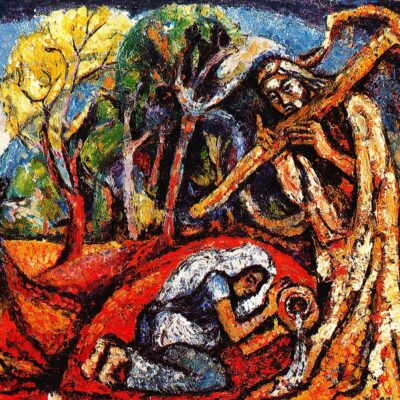by the Rev. Robert C. Laird
I’ve been reflecting on the church lately,
on why exactly we gather,
and what exactly churches do.
This is in part because I’ve just returned
from the College for Congregational Development,
a program of the Diocese that trains church leaders,
both lay and ordained,
in just such questions;
and I’ve certainly got some answers to the questions,
which don’t entirely answer them,
but rather bring up new questions to wonder about.
All the best questions do this:
bring up new questions to think about.
But I’m also wondering what churches do
because it’s important to really understand
what the purpose of a church is in the first place;
why do we gather together,
what is our purpose in being here,
and how do we best live that purpose as a community?
The model that best encapsulates the purpose of the church is:
Gather, Transform, Send:
We gather as a community,
we are transformed by the Gospel,
and we are sent out into the world
to spread the Good News of the Kingdom of God
to a world that desperately needs to hear that Good News.
That’s what we do,
or it’s what we’re called to do.
When the church does all three of those really well,
the church makes disciples left and right,
and invites others into the Christian life with us,
to celebrate the sacraments,
to pray, and learn, and love,
to live the disciplines of the life of faith,
to continue to grow in relationship with God and Christ,
to change the world by making the Kingdom of God
come near, right here, and right now.
Life as a disciple is what Jesus is talking about
in the 18th chapter of Matthew’s Gospel.
The Disciples are being breathtakingly human,
showing all their flaws,
and not understanding what Jesus is talking about,
which is one of the things they do best.
Jesus has just finished talking about
which of the Disciples is the greatest,
about how to deal with weaker disciples,
and how to discipline members of the church
who don’t live up to the church’s expectations.
And then Peter, in his most familiar role,
asks the question on everyone’s mind:
When can we STOP forgiving?
How about seven; is seven times enough?
One almost has to feel sorry for Peter,
whose job, it would seem,
is to ask all the dumb and obvious questions,
and look like an idiot a lot of the time
(right down to his nickname, Rocks, or Rocky,
which wasn’t likely a compliment, right?
But Jesus doubles down:
not seven, but seventy seven
(or seventy times seven,
which is 490;
the Greek isn’t entirely clear).
Regardless of the actual number,
the answer is A LOT.
A WHOLE LOT.
In fact, this sentence has often been interpreted
as meaning that we have to forgive always,
without end:
We never stop forgiving,
because God never stops forgiving.
But then Jesus goes on to tell a parable
that shows that even God has limits.
The Kingdom of God, Jesus says,
can be compared to a king who wants
to settle his accounts;
one slave, owing the king 10,000 talents,
had his whole debt forgiven;
that same slave, on his way out the door,
then found someone who owed him 100 denarii,
and threw him in debtors prison until he could pay it.
Let’s stop here for just a minute to get real about numbers:
there are two units of measurement here,
denarii and talents.
A denarius is a small silver coin
which was the standard of payment for one day’s labor,
for a laborer or a soldier.
It weighed about 4 grams.
It’s definitely worth something,
and 100 of them is a lot;
that’s 100 day’s wages.
A talent, on the other hand,
is a very, very large amount of money.
One talent was about 33 kg of gold
(which is almost 75 pounds of gold;
that’s a significant amount of money).
One talent was worth 6,000 denarii;
with the price of gold and silver what it is today,
a denarius was worth $2.62,
and a single talent is $1,497,537.
That would make the total sums we’re talking about
100 denarii, valued at $262,
and ten thousand talents, valued at $14.9 BILLION.
To put that number in a little more perspective,
of the 7.1 billion people on the earth right now,
there are only 70 who have personal fortunes that large.
So when Jesus is talking about a king
who forgives his slave a debt of 10,000 talents,
we are talking about an INCREDIBLY GENEROUS king.
On a quick side note,
I for one find it truly disappointing
that Jesus never tells us how on EARTH
the slave manages to rack up a debt that enormous;
I mean, how on earth do you end up owing
a BILLION dollars?
It boggles the mind…
Regardless,
in the Kingdom of God,
God is so forgiving, SO generous,
that even a debt so big
that it confounds the imagination
isn’t too big for God to forgive.
And this slave
succumbs to true irony
when he demands a fellow slave
pay up the $262 that he is owed,
and when he can’t come up with it,
has the poor guy thrown in jail.
10,000 talents vs. 100 denarii is vivid,
but putting today’s dollars on it
is truly shocking.
That’s the kingdom of the world:
One person is forgiven $14.9 billion in debt,
and has someone thrown in jail for $262.
But the Kingdom of God doesn’t work that way:
in the Kingdom of God,
it would have been better for that selfish slave
to have never had his debt forgiven;
when the king hears about
what a truly awful individual this guy is,
the king has the selfish slave thrown into jail himself.
Clearly, God’s forgiveness does have limits,
because the selfish slave ended up in prison,
being tortured until he could pay his entire debt.
HIS ENTIRE $14.9 BILLION DEBT.
God is forgiving, and loving,
and is capable of forgiving a lot.
But there is a point at which God’s forgiveness gives out.
We each have free will,
and get to use it, just like the selfish slave,
and just like the selfish slave,
we can use that free will to end up
on the wrong side of God’s judgment.
But it’s a pretty big bar,
that $14.9 billion bar that the slave set.
In the Kingdom of God,
God is forgiving,
and God expects us to be, too.
In this parable,
Jesus is teaching us how to treat each other,
how to live as disciples in the Kingdom of God,
a vital lesson for all of us in the church,
because the church is the place where
we learn how to be the disciples God has called us to be:
the Church is the place
where we learn how to forgive, and love,
and pray, and share,
and love, and pray, and share, and forgive,
over and over again,
shaping and forming our souls
through daily prayer, and regular study,
and worship as a community,
and learning how to forgive,
all of which are parts of what we do
as a community of faith,
called by God to life together here, and now.
Now, it should be said that this scripture
has at times been used in self-serving ways in history;
many women who suffered abuse by their husbands
were told they should just forgive their husbands
and try again,
because Jesus tells us never to stop forgiving,
even though their husbands’ behavior didn’t change.
That is wrong. That itself is a sin,
and it’s something we as the Church,
in the broadest sense of the term,
(not the church as St. Luke’s,
or even the Diocese of Olympia,
but the church writ large)
needs to ask forgiveness for,
from the women we’ve hurt,
and from God, too.
We’ve seen a vivid demonstration of the damage that
domestic violence can cause this week,
in the story of Ray Rice and his wife Janay,
and you may have heard other voices speaking up
for women who have no voice of their own;
hopefully, the day is coming, and coming soon,
when Christians stop using this scripture
as a way to let abusive spouses off the hook,
and further abuse women who are trapped with them.
But Jesus is giving us a message of hope today in the Gospel:
God is outrageously forgiving,
and so we can be outrageously forgiving as well:
we can forgive, and move on,
with God’s help,
because forgiving is really hard,
and it’s not really what we’re taught to do
in the culture we live in today;
we’re taught to remember,
and nurse grudges,
and we’re really good at it,
as people, and as a society.
But that’s the kingdom of the world,
and not the Kingdom of God:
in the Kingdom of God,
we forgive, because God forgives;
we love because God loves;
and we honor each other,
because relationships are primary
in the Kingdom of God.
Whoever you are,
whatever you have done,
God forgives you,
and wants to be in relationship with you,
to love you, and have you know and feel that love.
That’s what we do as a church:
we remind each other of that truth,
even when it’s hard to believe,
because things are hard,
or we feel that badly about ourselves;
and we support each other in experiencing that truth,
at deeper and deeper levels,
every day.
The life that God calls us to
is a life of prayer, study, worship, and service;
and central to that life
is our relationships with others;
relationships are primary in the Kingdom of God.
And forgiveness (along with love)
lies at the core of relationships.
Jesus is teaching us how much forgiveness
God has for us,
(nearly $15 billion, for instance),
if we forgive others,
and live the life we are called to.
And thanks be to God.



